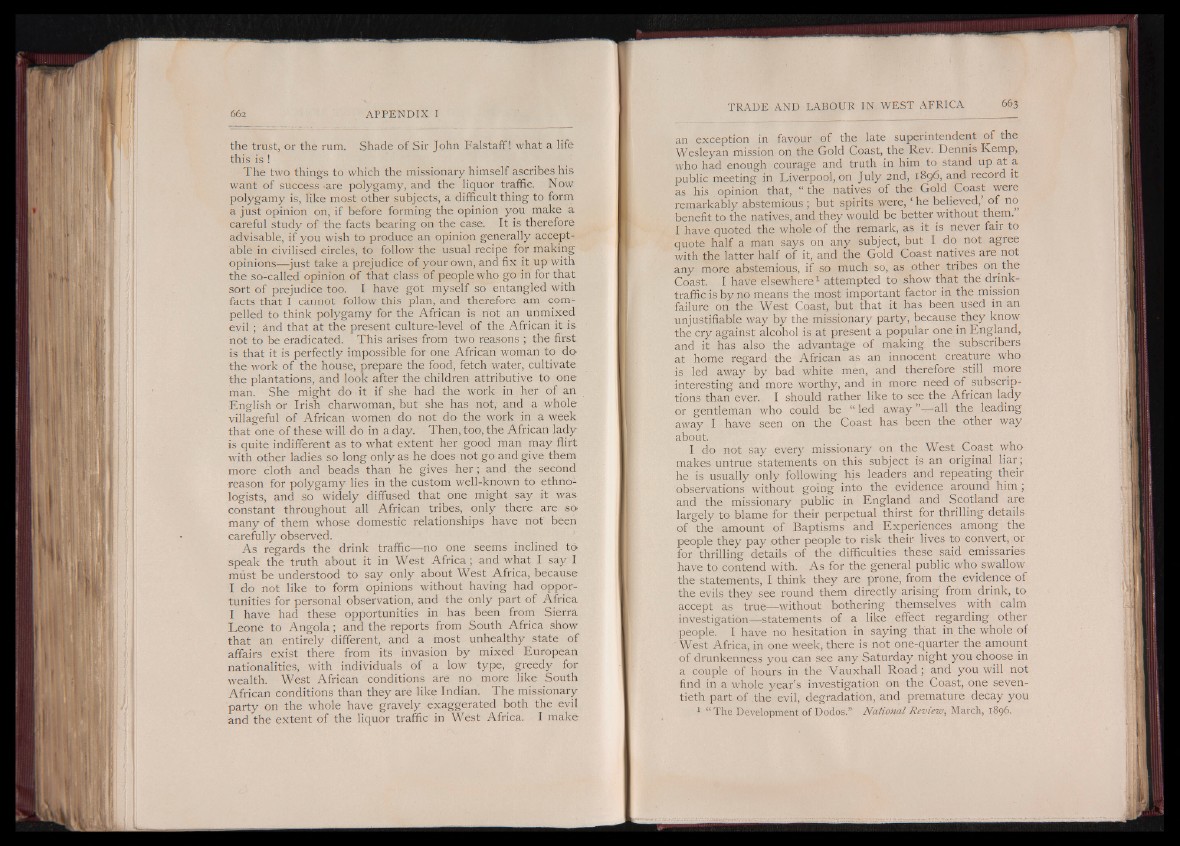
the trust, or the rum. Shade of Sir John Falstaff! what a life
this is !
The two things to which the missionary himself ascribes his
want of success -are polygamy, and the liquor traffic. Now
polygamy is, like most other subjects, a difficult thing to form
a just opinion on, if before forming the opinion you make a
careful study of the facts bearing on the case. It is therefore
advisable, if you wish to produce an opinion generally acceptable
in civilised circles, to follow the usual recipe for making
opinions— just take a prejudice of your own, and fix it up with
the so-called opinion of that class of people who go in for that
sort o f prejudice too. I have got myself so entangled with
facts that I cannot follow this plan, and therefore am compelled
to think polygamy for the African is not an unmixed
evil ; and that at the present culture-level of the African it is
not to be eradicated. This arises from two reasons ; the first
is that it is perfectly impossible for one African woman to do
the work of the house, prepare the food, fetch water, cultivate
the plantations, and look after the children attributive to one
man. She might do it if she had the work in her of an
English or Irish charwoman, but she has not, and a whole
villageful o f African women do not do the work in a week
that one o f these will do in a day. Then, too, the African lady
is quite indifferent as to what extent her good man may flirt
with other ladies so long only as he does not go and give them
more cloth and beads than he gives h e r ; and the second
reason for polygamy lies in the custom well-known to ethnologists,
and so widely diffused that one might say it was
constant throughout all African tribes, only there are s9
many of them whose domestic relationships have not' been
carefully observed.
A s regards the drink traffic— no one seems inclined to
speak the truth about it in West A fr ic a ; and what I say I
must be understood to say only about West Africa, because
I do not like to form opinions without having had opportunities
for personal observation, and the only part of Africa
I have had these opportunities in has been from Sierra
Leone to A n g o la ; and the reports from South Africa show
that an entirely different, and a most unhealthy state o f
affairs exist there from its invasion by mixed European
nationalities, with individuals of a low type, greedy for
wealth. West African conditions are no more like South
African conditions than they are like Indian. The missionary
party on the whole have gravely exaggerated both the evil
and the extent o f the liquor traffic in West Africa. I make
an exception in favour of the late superintendent of the
Wesleyan mission on the Gold Coast, the Rev. Dennis Kemp,
who had enough courage and truth in him to stand up at a
public meeting in Liverpool, on July 2nd, 1896, and record it
as his opinion that, “ the natives of the Gold Coast were
remarkably abstemious; but spirits were, ‘ he believed,’ of no
benefit to the natives, and they would be better without them.’
I have quoted the whole of the remark, as it is never fair to
quote half a man says on any subject, but I do not agree
with the latter half of it, and the Gold Coast natives are not
any more abstemious, if so much so, as other tribes on the
Coast. I have elsewhere1 attempted to show that the drink-
traffic is by no means the most important factor in the mission
failure on the West Coast, but that it has been used in an
unjustifiable way by the missionary party, because they know
the cry against' alcohol is at present a popular one in England,
and it has also the advantage of making the subscribers
at home regard the African as an innocent creature who
is led away by bad white men, and therefore still more
interesting and more worthy, and in more need of subscriptions
than ever. I should rather like to see the African lady
or gentleman who could be “ led away ’’— all the leading
away I have seen on the Coast has been the other way
about.
I do not say every missionary on the West Coast who
makes untrue statements on this subject is an original liar ;
he is usually only following his leaders and repeating their
observations without going into the evidence around h im ;
and the missionary public in England and Scotland are
largely to blame for their perpetual thirst for thrilling details
of the amount o f Baptisms and Experiences among the
people they pay other people to risk their lives to convert, or
for thrilling details o f the difficulties these said emissaries
have to contend with. A s for the general public who swallow
the Statements, I think they are prone, from the evidence of
the evils they see round them directly arising from drink, to
accept as true— without bothering themselves with calm
investigation— statements of a like effect regarding other
people. I have no hesitation in saying that in the whole of
West Africa, in one week, there is not one-quarter the amount
of drunkenness you can see any Saturday night you choose in
a couple of hours in the Vauxhall R o a d ; and you will not
find in a whole year’s investigation on the Coast, one seventieth
part of the evil, degradation, and premature decay you
1 i£ The Development of Dodos.” National Review, March, 1896.